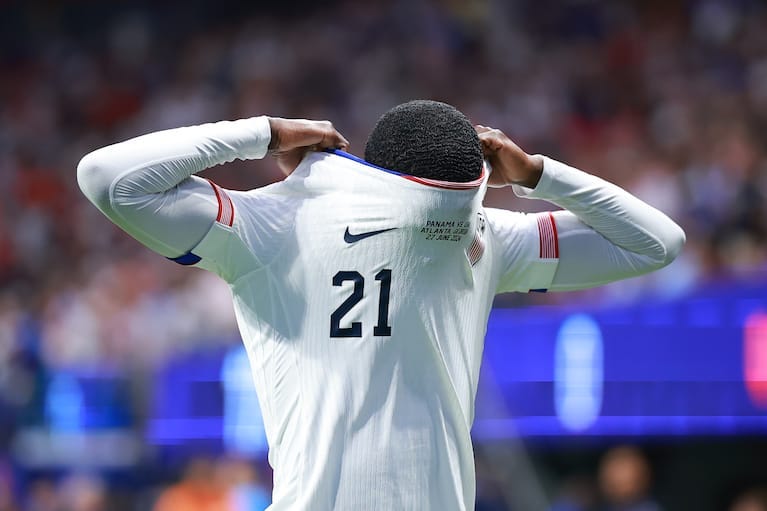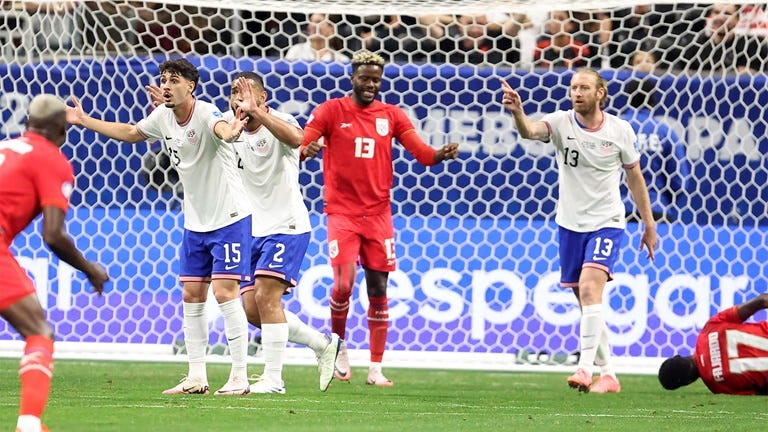It’s 1-1 at halftime and I’m sitting under a blanket shivering my ass off. It’s not cold where I am, but my body is rebelling against me. I’m about to hit the high point of a fever and I can’t sit in front of the television anymore. I move upstairs and enter a delirious dream for the next three hours which in hindsight seems a better experience than watching the second half.
Let’s talk about what this means for the team, the coach, and the fans. Not all is lost just yet, but we can’t keep taking two steps back for every one step forward.
The U.S. men's national team arrived at this summer’s Copa America under a cloud of lofty expectations. With the World Cup set to take place on home soil in just two years, this was the time to build a momentum towards the biggest sports event in the world.
This team was seen as potentially capable of achieving greater feats than any U.S. men’s squad before it. The Copa America hosted by the U.S. was not just a rehearsal for the World Cup but also a stage to demonstrate their readiness to contend for the sport's most prestigious trophy in 2026.
However, the dream took a significant hit following a shocking 2-1 defeat to Panama in Atlanta on Thursday. Instead of cruising into the knockout stages, the U.S. now finds itself in a precarious position, needing to avoid elimination in the group finale next week.
The loss has been a stark reality check, tempering the optimistic discourse that had surrounded the team. The evening turned even darker when several players were subjected to racist abuse on social media. U.S. Soccer issued a statement expressing deep disturbance at the comments, noting they had contacted CONMEBOL, the South American federation overseeing the tournament, and would be offering mental health support to any affected players and staff.
This grim aftermath overshadowed what should have been another step forward in the team’s progression. While the U.S. has enjoyed success in CONCACAF, they lack a signature win against a top-tier opponent. Hopes were high that such a victory could come in this tournament’s knockout stage, possibly against the likes of Brazil or Colombia. Now, facing a do-or-die situation earlier than anticipated, they must regroup for Monday’s crucial match against Marcelo Bielsa’s formidable Uruguay.
For U.S. coach Gregg Berhalter, the pressure is mounting. When asked at the post-match press conference if his job was on the line against Uruguay, he responded, “That’s not for me to determine.” This question underscored the magnitude of the disappointment against Panama and the high stakes for the team in this tournament. Progressing to the knockout stage was the minimum expectation, and now that is far from assured. A win against Uruguay in Kansas City would likely secure their advancement, but goal differential could also play a role. The outcome will also depend on the result of the simultaneous Panama-Bolivia game in Orlando.
This was a day of reckoning for Gregg Berhalter and the USMNT, and I do believe Monday night’s match against Uruguay will decide if Berhalter stays in his job or not.
To achieve this, the team must avoid further mishaps, like the one that saw them play over 70 minutes with 10 men after Tim Weah was sent off for shoving Panama’s Roderick Miller. This uncharacteristic moment from Weah, typically one of the team’s most reliable (and kind) players, was sparked by a seemingly innocuous tangle in midfield.
“We had a collision,” Miller explained post-match. “He used excessive force and raised his hand to me. It wasn’t justified.”
Weah apologized to his teammates in the locker room, expressing his regret on Instagram later: “Today, I let my team and my country down. A moment of frustration led to an irreversible consequence, and for that, I am deeply sorry.”
This moment, however, proved to be the game’s turning point. Although the U.S. took the lead shortly after Weah’s red card through Folarin Balogun, they conceded an equalizer just four minutes later and spent the rest of the match on the back foot, completing only 26 passes in the first half after Balogun’s 22nd-minute goal.
In the second half, Berhalter switched to a five-man defense, but Panama's Jose Fajardo found the winner in the 83rd minute, firing past Ethan Horvath, who had replaced Matt Turner at halftime due to injury. Turner’s availability for Monday’s match in Kansas City is still uncertain, pending further evaluation.
While the red card significantly altered the match, it didn’t mitigate the sting of the result. Losing at home to Panama, a CONCACAF rival they were favored to beat, was a tough pill to swallow. The U.S. had opportunities to secure at least a draw but failed to capitalize.
“I was proud of our response,” Pulisic said. “But the result takes it all away. It’s disappointing.”
Before the tournament began, several U.S. players spoke to reporters about the expectations and the belief within the group. There was talk of managing the tournament one game at a time but also an acknowledgment of the high hopes from fans and the country’s growing belief in the team.
This Copa America was about validating that belief, proving that this team could achieve something unprecedented. “We all want the same thing as the fans,” Pulisic had said. “We want to show we’re one of the best teams in the world. We want to compete with the best and win this tournament.”
The loss to Panama has shown there is still a long way to go. While the chance to advance and make a deep run in the tournament isn’t lost, the path has become significantly more challenging. The match against Uruguay is now a pivotal moment to either live up to the hype or fall short.
The stakes couldn’t be higher as the U.S. prepares for this crucial game. A win would not only keep their Copa America hopes alive but also restore a bit of good faith in their potential to shine on the global stage come 2026. However, a loss could lead to a broader evaluation of the program and its direction under Berhalter.
This is a defining moment for the U.S. men’s national team. The pressure, the expectations, and the desire to prove themselves on home soil will all come to a head on Monday. It’s time for this team to show whether they are ready to take the next step or if there is still more work to be done. The nation will be watching, hoping for a performance that reignites the dream and sets the stage for a brighter future.
If we lose, this could be a moment as negatively profound as the 2017 loss to Trinidad & Tobago which say us miss the 2018 World Cup. That cannot happen and if it does, changes must be made before this team takes the pitch two summers from now on the world stage.








Times up on baldy
I'm not saying Gregg's job isn't under fire; it most certainly is if we don't get out of the group. But all the pundits out there blaming him for this one are being ridiculous...and I'm not talking about you, Jake. I stopped watching Futbol Americas a few months ago because of Herc's Skip Bayless approach to literally everything (and his extremely over-inflated view of his own career) -- but I came across their comments this morning. Blaming Berhalter for this is just an excuse to carry on the vendetta they've had since day 1.
TO BE CLEAR, I don't think he should've been re-hired once the contract expired, but of all the things you can blame Gregg for, this ain't one of 'em.